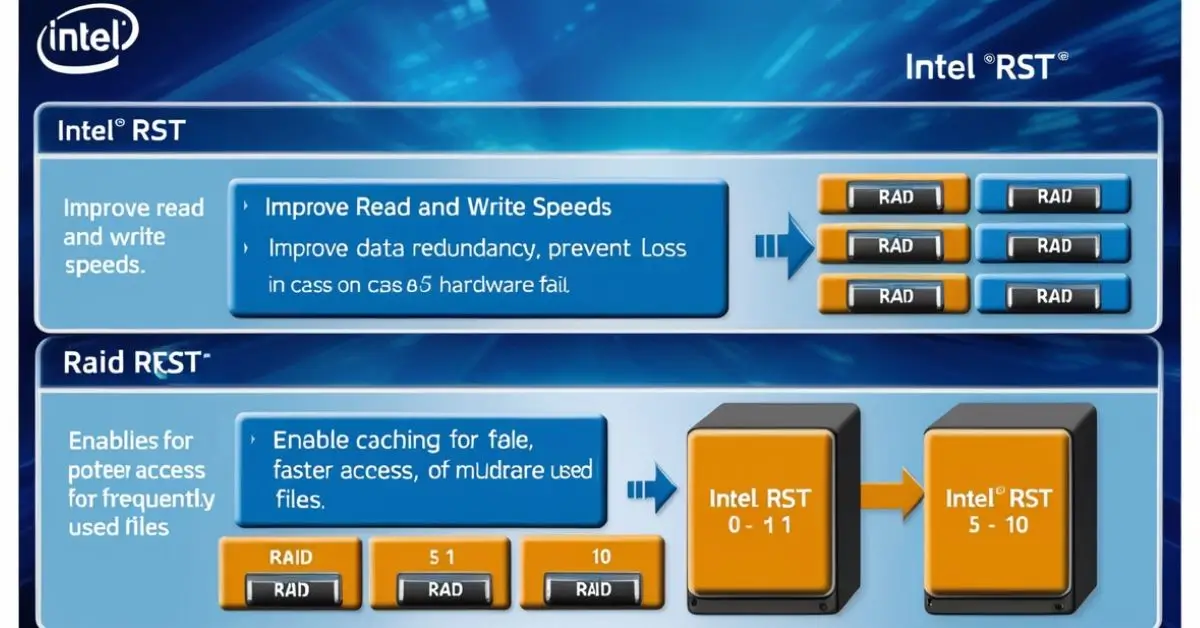Intel Rapid Storage Technology (IRST) is a tool designed to enhance storage efficiency, improve data access speeds, and ensure redundancy for users with multiple storage devices. A key question that often arises is whether the CC62 feature or version of IRST provides encryption, ensuring robust data security for sensitive information. In this comprehensive guide, we’ll delve into the technical details, functionalities, and encryption capabilities of Intel RST, focusing on the role of CC62.
What Is Intel Rapid Storage Technology (IRST)?
Intel RST is a software and firmware suite designed to optimize storage performance on systems with multiple drives. It leverages RAID (Redundant Array of Independent Disks) configurations to:
- Improve read and write speeds.
- Enhance data redundancy to prevent loss in case of hardware failure.
- Enable caching for faster access to frequently used files.
This tool is especially beneficial for professionals, gamers, and enterprises that handle large volumes of data. Intel RST supports RAID levels 0, 1, 5, and 10, each catering to different needs for speed, redundancy, or a combination of both.
Understanding Encryption in Intel RST
Encryption is a process that transforms data into an unreadable format unless accessed with the correct decryption key. It is crucial for safeguarding sensitive information from unauthorized access or theft. However, encryption in IRST is not a built-in, standalone feature but rather depends on hardware and software configurations.
Decoding CC62: Does It Include Encryption?
CC62 refers to a specific feature set or version identifier within Intel RST. While it represents advancements in functionality and compatibility, it does not inherently guarantee encryption. Instead, encryption capabilities in Intel RST rely on:
- Hardware Compatibility: Systems equipped with Trusted Platform Module (TPM) chips or self-encrypting drives (SEDs).
- Third-Party Integration: Using tools like BitLocker to enable secure data encryption in tandem with IRST.
Security Benefits of Encryption in IRST
For systems that support encryption, the combination of IRST and secure storage offers the following benefits:
- Enhanced Data Security: Data on encrypted drives cannot be accessed without the proper decryption key, even if the drives are physically removed.
- Regulatory Compliance: Encryption helps organizations meet legal requirements such as GDPR, HIPAA, or PCI DSS.
- Seamless Operation: Hardware-level encryption ensures minimal performance degradation while securing data.
How to Enable Encryption with IRST
If your system supports encryption, here are the steps to secure your data:
- Verify Hardware Support: Confirm compatibility with TPM or SEDs.
- Access BIOS Settings: Enable encryption-related options, often labeled under “Security” or “Storage Configuration.”
- Configure RAID: Choose a RAID level that aligns with your needs, such as RAID 1 for redundancy or RAID 10 for combined speed and fault tolerance.
- Secure Encryption Keys: Store decryption keys in a safe location to ensure data recovery in case of a system failure.
RAID Levels and Their Role in Data Security
Intel RST supports multiple RAID configurations, each offering unique benefits for storage management and security:
- RAID 0: Focuses on performance by striping data across drives. However, it lacks redundancy.
- RAID 1: Provides data mirroring, creating identical copies on two drives for enhanced reliability.
- RAID 5: Balances performance and security by distributing data and parity information across multiple drives.
- RAID 10: Combines the benefits of RAID 0 and 1, offering both speed and fault tolerance.
Encryption can be applied alongside these RAID setups to further secure stored data.
Comparing Encryption Options: IRST vs. Alternatives
While IRST facilitates efficient storage management, encryption can be further enhanced through additional tools and technologies. Below is a comparison of common encryption methods:
| Feature | IRST with Hardware Encryption | BitLocker | Self-Encrypting Drives (SEDs) |
|---|---|---|---|
| Performance Impact | Minimal | Moderate | Minimal |
| Ease of Use | Moderate | High | High |
| Security Strength | Strong | Strong | Very Strong |
| Compatibility Requirements | Hardware-dependent | Software and OS-dependent | Independent |
Troubleshooting Common Issues
- Encryption Not Available: Ensure that the BIOS is up-to-date and encryption-enabled hardware is installed.
- Slow Performance: If encryption slows down data access, consider hardware upgrades or adjusting RAID configurations.
- Decryption Errors: Verify that the correct keys are used and that IRST software is current.
Alternatives to IRST for Encryption
For systems where Intel RST cannot fully meet encryption needs, consider these alternatives:
- BitLocker: A Microsoft tool that provides full-disk encryption and integrates seamlessly with Windows systems.
- VeraCrypt: An open-source solution ideal for users seeking flexibility and customization.
- Self-Encrypting Drives (SEDs): These drives offer built-in encryption, providing robust security with minimal setup.
Performance Impact of Encryption
Modern systems have minimized the performance impact of encryption, especially with hardware-based solutions. While software encryption can slow down operations, hardware encryption through IRST ensures efficient data handling without noticeable latency.
Practical Use Cases for IRST and Encryption
- Enterprises: Protect sensitive business data while improving access speeds.
- Gamers: Enhance performance and safeguard game files.
- Personal Users: Secure photos, videos, and documents against unauthorized access.
Final Thoughts
Intel Rapid Storage Technology, particularly with features like CC62, offers a robust platform for managing and optimizing storage. However, it does not inherently include encryption. By combining IRST with compatible hardware or third-party tools, users can achieve a secure and high-performance storage environment. This hybrid approach ensures data is not only accessible and efficient but also protected against modern cybersecurity threats.
FAQ
- Is encryption enabled by default in IRST?
No, encryption requires additional configuration and compatible hardware. - Can IRST work with third-party encryption tools?
Yes, IRST integrates well with solutions like BitLocker. - Does encryption impact RAID performance?
Modern encryption methods have minimal impact, particularly with hardware solutions.












